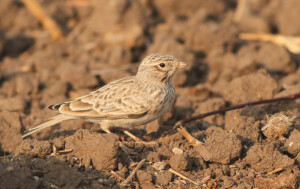Changes to the British List (3 Oct 2023)
The British Ornithologists’ Union Records Committee (BOURC) has removed Lesser Short-toed Lark Alaudala rufescens from Category A of the British List.
View the British List

Photo (right) Lior Kislev CC BY-SA 4.0 Wikimedia Commons
The Lesser Short-toed Lark complex has recently been the subject of two studies that have used genetic, morphological, behavioral and bioclimatic data to revisit species limits in the group (Zoologica Scripta 49:427-439; Molecular Phylogenetics and Evolution 154: 106994). Taxonomic recommendations from these investigations have led to a number of splits incorporated into the IOC World Bird List, namely the recognition of the cryptically similar Asian Short-toed Lark A. cheleensis of south-central to eastern Asia, Mediterranean Short-toed Lark A. rufescens of the Mediterranean Basin, and Turkestan Short-toed Lark A. heinei of western and parts of central Asia. All of these species are potential vagrants to Britain, and there is an accepted record of Turkestan Short-toed Lark from Sweden confirmed by genetic analysis (British Birds 115: 288-292).
Following these taxonomic revisions it was necessary to investigate if the identification of the sole British record from Portland, Dorset on 2 May 1992 could be established at the species level. A review by both BOURC and the British Birds Rarities Committee (BBRC) found that it was not possible to assign this individual from the original submission – which consisted of written descriptive notes and sketches – to one of the ‘new’ species which are extremely similar. Establishing a species-level identification in this group would likely necessitate very high quality images and perhaps genetic data and biometrics. Consequently BOURC voted to reject this record as A. rufescens but instead accept the record as the species group A. cheleensis/rufescens/heinei meriting publication in Appendix 4 of the British List (Ibis 164: 909-910).
These changes will be published as part of the BOURC’s 57th report due to be published in Ibis in January 2025. Upon publication of this change, the British List stands at 632 species (Category A = 614; Category B = 8; Category C = 10).

